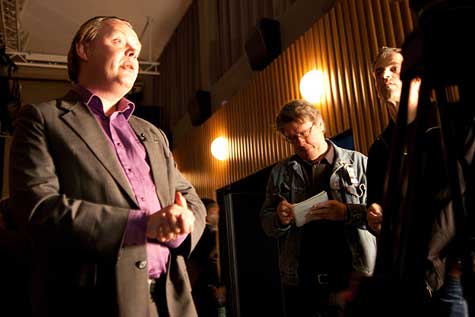New Zealand’s law makers have come to their senses and canned the ‘Guilt Upon Accusation’ aspect of Section 92 [ http://www.scoop.co.nz/stories/PA0903/S00330.htm ]. Now that the non-sense that is Section 92A is behind us (for the meanwhile) let’s put our heads together and have a good hard think about what copyright is, what is the goal of copyright and is it still relevant to our current cultural enviroment. I am not saying that we should scrap copyright laws but I do think that we as rich and vibrant cultural community need to have a good hard look at the concept of copyright. I personally am a big fan of Creative Commons [http://creativecommons.org] as an alternative to Copyright. What do you think? What are your thoughts on the matter? Feel free to leave a comment below.
Here’s a recent article that Andrew Dubber, author of newmusicstrategies.com, wrote about copyright and the music industry {reposted with permission}.
Coalition for Culture

I love the music business. I think musicians are great. I believe they do amazing things that are richly deserving of great rewards, the lot of them. I think it’s appropriate that everyone gets whatever they deserve. It’s a hard world, a hard way to make a living and times are tricky.
As I’ve often said, most musicians spend more time training for their career than most brain surgeons – and most of them end up earning less than most supermarket checkout operators. And that’s both significant and important.
But the establishment and announcement of the Featured Artists Coalition over this past week or so has made me a bit cross.
It’s easy to have sympathy with their position – especially if you happen to like, as I do, many of the artists who belong. I have no problem with the fact that it exists. I have no issue with musicians forming collectives and arguing in what they see to be in their interests.
I don’t happen to agree that what they’re arguing for is something that will help them. I don’t think they’re deceptive or manipulative – I think they’re mistaken on this point.
And while it’s also easy enough to dismiss them as a bunch of rich and famous people complaining that they’re being unfairly treated because they’re not quite as powerful and greedy as the major record labels – there’s something noble and hopeful in the idea that they might be doing this for the little guy.
But while it’s cool that pop musicians have their lobby group, and just fine and dandy that major record labels have theirs – there’s a massive imbalance in values being represented here. Policy makers are being bombarded at all sides with persuasive arguments that, while they may differ in terms of whose commercial benefit is at stake, are predicated on the idea that music is, purely and simply, commerce.
To my knowledge, there exists no organisation whose purpose is to promote the interests of popular music as cultural good, rather than as commercial interest.
And as a result, politicians come away with the strong sense that every important stakeholder believes that the most important thing to do as a matter of priority is to extend the term, the scope and the power of copyright and intellectual property law.
But there are all sorts of reasons to contest that notion, and there are all sorts of important and intelligent sections of our society that do. Moreover, there are a bunch of other issues that become important and take on a different tone if popular music is considered from the cultural perspective as well as from just the commercial perspective.
Copyright is, of course, very important. Its purpose is to incentivise the creation of new cultural works, so that we can have a vibrant and rich cultural environment full of new inventions, helpful science, great music and interesting works. By setting it up so that the creators and subsequent owners of those works can have a monopoly over how those works can be used for a period of time means that businesses and sources of income can be found that will support the ongoing creation of those sorts of works.
It’s a great system. But it’s a system with a purpose. To argue that the function of copyright is to ensure that musicians and rightsholders can still earn off something they made 95 years ago is an interesting and often compelling argument – but it puts the cart before the horse.
Stopping people from hearing or otherwise using music unless they pay for it is not the way to ensure that new works are being created all the time in the interests of culture. It stops culture from being created and propagated. And culture is about people. It’s about having a good and interesting life full of wonderful things. Music has the potential to massively contribute to that. Sensible copyright encourages that. Absurd and draconian copyright prevents it.
It’s a bit like salt. Some salt on your food is good. Covering your food under a mountain of salt makes the food pretty unpalateable, even if it stops that food from going off.
A couple of examples. In the past year, I’ve done some work with the BBC and the British Library. Here are two cultural organisations whose good works are being hamstrung by rightsholders who (perhaps understandably) put their commercial interests before those of the citizenry of the country. The general public.
Despite being willing to negotiate and pay reasonable amounts of money in royalties, BBC Radio is forced into a position where they make podcasts containing no more than 30 seconds of music. So – speech radio is a viable public service media form – but there can be no music-centred public service online media, despite the clear value for public good that specialist music radio has.
The British Library have a sound archive that includes thousands of pieces of recorded music. Unfortunately, researchers and scholars are unable to use a great deal of that material in their research, as quoting or referencing that music infringes on the property rights of the record labels. There is no clear commercial reason for record labels to allow researchers to study their catalogue, and so the position is intractable.
And the public suffers. Culture suffers. Intellectual progress suffers. The people who vote for the politicians, and for whose benefit all policy – economic, cultural, legal and infrastructural – is set, suffer.
But culture has no seat at the table. There is no lobby group for popular music as culture. There are copyright reform advocacy groups, and their involvement would be very important. But that’s not all this is about. There are important decisions being made right now for arts, culture and heritage all around the world. These issues are more urgent than ever because of the opportunity afforded us by digital technologies.
Music IS commerce – and it’s important that voice is represented, and it’s important that every stakeholder with that interest is represented. But music is not JUST commerce – and it’s now a matter of extreme urgency that the voice of music as culture is expressed.
And aside from anything else – culture leads commerce. You make smart and profitable businesses by looking at what people want to do, and providing them with great ways of doing that. You don’t make smart and profitable businesses by standing in the way, insisting they behave differently or by trying to prevent culture from happening unless you continue to get a slice.
This is NOT a debate about copyright. We’ve rehearsed that argument over and over again on this site. Far be it from me to stop you continuing the debate in the comments section, but in my mind, it’s an argument that needs to be shifted to a different context – one in earshot of the actual policymakers.
Instead, this is a call for the creation of a collective group who can represent the interests of popular music culture stakeholders: academics, librarians, entrepreneurs, public broadcasters, community musicians, remixers, amateurs, curators, archivists, documentarians and citizens who wish to live in a society where music is part of the cultural fabric, and where artists and rightsholders are fairly rewarded – but never at the cost of a complete cultural lockdown.
We need a Coalition for Culture and we need it urgently.
 After the earlier hearings, the Commerce Select Committee have now reported back on the draft Copyright (Infringing File Sharing) Amendment Bill [PDF]. They have recommended that Internet Termination be temporarily disabled until it’s deemed necessary which is a slight improvement on the previous bill that had termination as an available penalty. Internet Termination itself remains problematic: we don’t cut off people’s access to the postal system, or phonelines if they’re used to break the law. Most internet accounts are shared, and Internet Termination will affect many people for the actions of one. Because there are no government statistics about infringing inter net downloading in New Zealand any decision to enable termination would be based on lobbying, not independent government research, and Internet Termination could be enabled in cabinet without a vote in parliament. Commerce Committee member Clare Curran explains the reasoning behind this.
After the earlier hearings, the Commerce Select Committee have now reported back on the draft Copyright (Infringing File Sharing) Amendment Bill [PDF]. They have recommended that Internet Termination be temporarily disabled until it’s deemed necessary which is a slight improvement on the previous bill that had termination as an available penalty. Internet Termination itself remains problematic: we don’t cut off people’s access to the postal system, or phonelines if they’re used to break the law. Most internet accounts are shared, and Internet Termination will affect many people for the actions of one. Because there are no government statistics about infringing inter net downloading in New Zealand any decision to enable termination would be based on lobbying, not independent government research, and Internet Termination could be enabled in cabinet without a vote in parliament. Commerce Committee member Clare Curran explains the reasoning behind this.



